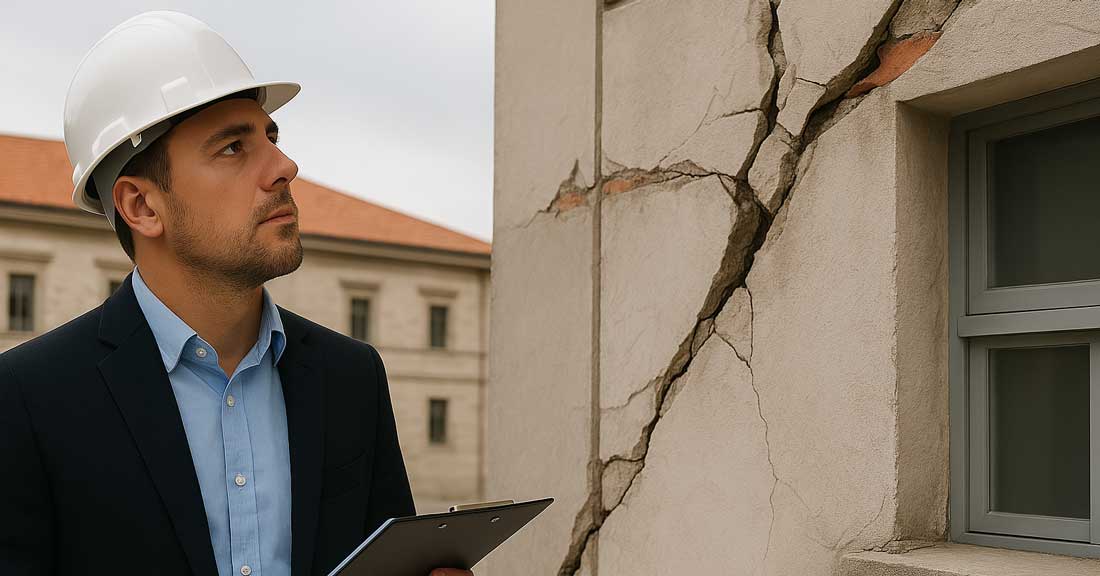Italy has a high seismic hazard due to its geological and tectonic configuration. Events such as the 2016 Amatrice earthquake and, in the past, those of L’Aquila in 2009, Irpinia in 1980, and Friuli in 1976 have highlighted how crucial it is to protect communities and infrastructures from the destructive energy of seismic phenomena. In this context, earthquake engineering plays a pivotal role in ensuring the safety of buildings, reducing earthquake damage, and, above all, safeguarding human lives.
What is earthquake engineering?
Earthquake engineering is a branch of civil engineering that studies the behaviour of structures during earthquakes and, consequently, techniques and technologies to reduce the impact of earthquakes on buildings and design safe and resilient constructions.
Earthquake engineering works on a broad spectrum of all available structural types to assess their criticalities and possible improvements. It considers all parties involved in both new construction and existing construction.
Concerning new construction, earthquake engineering evaluates new design approaches and innovative technologies with a strong focus on environmental impact.
In the field of existing buildings, it intervenes by studying structures’ vulnerabilities and proposing seismic improvement and/or adaptation interventions. These studies are critical in countries like Italy, which has an impressive historical and artistic heritage.
Also not to be neglected is the study of what are identified as non-structural elements, i.e., all those components that serve the building’s functioning and use but do not have a ‘load-bearing’ function.
All these activities, which were initially conducted at the scientific and industrial research level, translate into practical regulatory updates, guidelines, design criteria, and technology development. The technical reference standards to be considered in the sector are undoubtedly the Technical Standards for Construction (NTC) in force in Italy and Eurocode 8 (EN 1998), which is currently being updated.
 Eucentre is a non-profit private law foundation whose mission is to conduct research and provide training and services in earthquake and safety engineering
Eucentre is a non-profit private law foundation whose mission is to conduct research and provide training and services in earthquake and safety engineering  Eucentre promotes science, research and innovation for the benefit of the community, offering targeted methodologies and concrete solutions for prevention, safety and resilience. It collaborates with institutions and companies to disseminate competencies for the common good.
Eucentre promotes science, research and innovation for the benefit of the community, offering targeted methodologies and concrete solutions for prevention, safety and resilience. It collaborates with institutions and companies to disseminate competencies for the common good. Eucentre conducts earthquake engineering research and risk reduction studies via laboratory testing and numerical analysis to enhance seismic performance and develop innovative solutions
Eucentre conducts earthquake engineering research and risk reduction studies via laboratory testing and numerical analysis to enhance seismic performance and develop innovative solutions  Eucentre carries out research activities in earthquake engineering and risk reduction through laboratory testing and numerical analysis, aiming to improve the seismic performance of structures and soils and to develop innovative seismic retrofitting techniques.
Eucentre carries out research activities in earthquake engineering and risk reduction through laboratory testing and numerical analysis, aiming to improve the seismic performance of structures and soils and to develop innovative seismic retrofitting techniques. The Foundation promotes diverse and high-quality training activities aimed at academic and professional contexts, with constantly updated and innovative programs and initiatives designed to meet the evolving needs of the sector and society
The Foundation promotes diverse and high-quality training activities aimed at academic and professional contexts, with constantly updated and innovative programs and initiatives designed to meet the evolving needs of the sector and society  Eucentre ensures communication aimed at informing institutions, professionals, and citizens about ongoing activities and projects, with the goal of disseminating useful and accessible content and knowledge. It contributes to promoting a shared and informed culture of prevention and resilience.
Eucentre ensures communication aimed at informing institutions, professionals, and citizens about ongoing activities and projects, with the goal of disseminating useful and accessible content and knowledge. It contributes to promoting a shared and informed culture of prevention and resilience.
